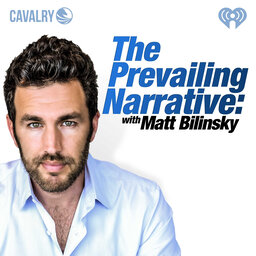Episode 28: Political Scientist Wilfred Reilly on Gun Control, Targeted Solutions, and the Facts and Myths About Gun Violence in America; Nihilism and Mass Shootings
0:11 - Intro: Why is America producing more mass shooters? We take a look at Katherine Dee's piece on America's unique brand of Nihilism and how modern society's ultra-individualism may be leading to dark results.
14:50 - Political Scientist Wilfred Reilly joins Matt to discuss his recent Newsweek piece on Gun Control and "Targeted Solutions". We try to attack the issue of gun control and recently proposed legislation from all angles, as well as many of the myths around gun violence and recent related political/social movements.
In 1 playlist(s)
The Prevailing Narrative with Matt Bilinsky
A lively and fiercely analytical breakdown of news and current events, with interviews of thought le…Follow podcast
Recent clips

Episode 30: "Dark Plots & Secret Explanations": Study Rejects "Chemical Imbalance" as Cause of Depression (Max Lugavere Discusses); Biden & His Media Surrogates Re-Define "Recession; Kansas Abortion Ruling; Zelensky Poses for Vogue(?!); Public Health Lies on Monkeypox
1:38:34

Episode 29: Kamal Ravikant - Silicon Valley Thought-Leader, Investor, & Bestselling Author on Loving Yourself, Stepping Past Fear, Extreme Sharing, Investing Skills, and Living a Life of Honesty, Adventure and Authenticity
1:12:12

Episode 27: Soros DA Chesa Boudin Gets Bounced; Washington Post Descends Into Chaos; Russia Update and Gas Prices Hit Record High; Peter Navarro Arrested & Man Tries to Assassinate Justice Kavanaugh
47:41
 The Prevailing Narrative with Matt Bilinsky
The Prevailing Narrative with Matt Bilinsky